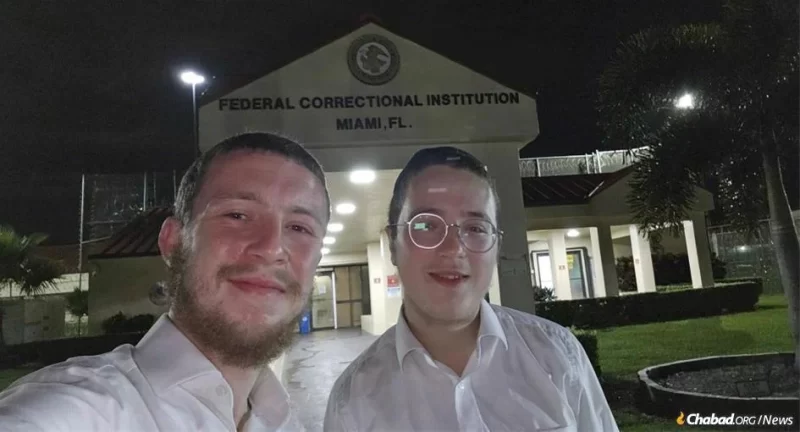
Rabbinical Students to Bring Hope and Faith to Jewish Inmates on Yom Kippur
by Rochel Horowitz – chabad.org
Dozens of Chabad rabbinical students from across the United States are preparing to spend Yom Kippur—the Jewish Day of Atonement—at 14 prisons across the country, making an indelible impact on the lives of those who may have otherwise been forgotten. The Aleph Institute is at the heart of this annual endeavor.
For Avi Katz, Aleph’s mission is deeply familiar. His father, Rabbi Menachem Katz, is Aleph’s director of prison and military outreach. He said his father’s three decades of commitment to the incarcerated has been an integral part of his life as well. When he was growing up, reaching out to inmates was second nature. Be it via arranging packages for those in prison or extending Shabbat invitations on behalf of his family to former inmates, the well-being of Jews behind bars was always at the forefront of his and his family’s minds.
“I always knew that someday I would be visiting prisons, and I eagerly anticipated that day,” Katz told Chabad.org. And for the past three years, he’s been visiting prisons on Jewish holidays. This year, he and Uri Libersohn, a rabbinical student from Mexico City, will lead services for 36 Jews at the Everglades Federal Correctional Institution in Miami on Yom Kippur, which begins several minutes before sunset on Sunday, Sept. 24, and ends after nightfall on Monday, Sept. 25.
Reflecting on his past visits, Katz shared: “The first thing that hits you is the sense of appreciation. Other than a rabbi who sees them a few times a year, most inmates don’t have people who visit them, so we are very welcomed.”
He recalls one Yom Kippur when he faced a dilemma. Initially, he hesitated to read the Al Chet (“for the sins”) segment of the services in English, fearing it might make the inmates uncomfortable.
However, as a rapport developed with the inmates, he mustered the courage to do so, and the response was profound. “Out of the corner of my eye, I saw two or three inmates begin to cry as they spoke to G‑d from the depths of their hearts,” he said. “It was the most meaningful thing to witness—their essence came out.”

Inmates Express Their Gratitude
Inmates who participated in Rosh Hashanah services this week with the visiting rabbis expressed their appreciation in written responses to Chabad.org. They told of the impact the visit had on their lives and how they were eagerly awaiting the rabbis’ return on Yom Kippur.
“The volunteers who came to lead our Rosh Hashanah services were amazing,” wrote one inmate at the Coleman Federal Correctional Institution (FCI) in Florida. “Rabbis Shmuli and Moshe [Shmuli Hecht and Moshe Rozenblat] led one of the most complete and enjoyable services I’ve ever attended, inside prison or outside. They tailored the services to the knowledge and comfort level of the inmates, taking time to explain the halachic basis for the prayers and practices, not merely reciting them. For myself and the others, who are separated from family during this significant time, their visit gave us the opportunity to feel a semblance of normalcy and remind us that even in the worst of places we are not forgotten.”
An inmate at the Pensacola, Fla., FCI wrote: “The fact that there are people not only able but also willing to come, help us and be away from their families to enable this for us is beyond humbling. They provided words of hope and inspiration in trying times, as well as resolve to keep on pushing forward.”

Inmates at the Fort Dix FCI in New Jersey expressed their gratitude for the young rabbis who led the Rosh Hashanah services.
“Mendy Shapiro and Dovid Vaisfiche were superb,” wrote one inmate. “They came prepared with confidence and divrei Torah [‘Torah insights’]. They were relaxed, laid back yet attuned. Their davening [‘praying’] was beautiful, as was Mendy’s laining [‘Torah reading’]. Please pass kudos along to the bochurims’ [‘students’] rabbis. Thank you for coming through for us”
A second inmate at Fort Dix had a request. “If we can still ask, if possible, for Yom Kippur, to send an additional two guys. It helps for the tefillah and environment. Also, (we hope) that one of them (will) be a kohen [‘priest’]. We had such a bracha [‘blessing’] to have Birkat Kohanim for Rosh Hashanah, something we did not have in over four years here. That was amazing.”
In Connecticut, one inmate wrote “I, along with the entire congregation of FCI Danbury, want to say thank you for all you and Aleph have done and are doing for these High Holidays. The three volunteers who visited with us this past weekend were so kind, knowledgeable and generous. At all times, they were composed and on point, even when we had to stop during the reading of the Torah so that the institution could do its 10 a.m. count.”

‘Their Faces Light Up’
Rabbinical student Uri Libersohn, whose father is the rabbi of the Ashkenazi community of Mexico City, said he was always committed to reaching out to Jews wherever they may be. But initially, he said, the idea of spending the holidays in prison was perplexing: “Spend Yom Kippur, the holiest of Jewish days, within the walls of a prison?”
But he soon learned how deeply meaningful these holidays would be, as they’d become the cornerstone of his yeshivah years. “As soon as they see us, their faces light up,” said Libersohn. Following his first Yom Kippur behind bars, he’s returned, year after year, to various prisons.
Levi, a rabbinical student from Brooklyn, N.Y., who asked not to be identified by last name, will be joined by student Shmuli Mayburg at the Terminal Island Correctional Institution in San Pedro, Calif. As they prepared for their upcoming trip, Levi expressed gratitude for the opportunity provided by the Aleph Institute. “Just because someone did something wrong doesn’t make them any less deserving of love and respect. They deserve another chance,” he said.

A 58-year-old inmate who has been incarcerated for more than 30 years at the Sumter Correctional Institution in Florida—and has participated in many Aleph programs during his time in prison—wrote how grateful he was for the visit this Rosh Hashanah and how much he is looking forward to their return on Yom Kippur.
“Our most recent visit, from Rabbis Dovid and Chaim, was as rich as the most pure honey,” he wrote. “We prayed, we sang, we danced, we learned together. When the rabbis had to leave the institution between Shacharit [morning] and Minchah [afternoon] services our time was spent as a community eating, studying, talking, and asking questions on Torah knowledge of one another. Anything we could not find a definitive answer to we saved for the rabbis’ return, which they were more than happy to field for us.”
“The Aleph Institute gives personal attention to every one of us. The volunteers make me feel like I’m the only Jewish inmate they exist for. Man, does that make me feel special, and it makes me want to grow constantly in my Jewishness and observance. I would hate to imagine where I might be today, into what darkness I would find myself were it not for the dedication they have shown me.”
“The High Holiday Services conducted by the volunteers present us with a pathway to forgiveness of ourselves and from Hashem (G‑d),” he concluded. “They open doors we never knew existed to a life we never thought possible. That’s exactly what has happened to me.”















